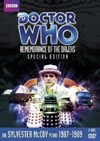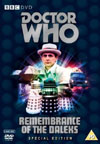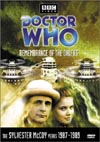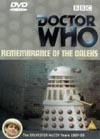Special Edition DVD Extras include:
Group-Captain "Chunky" Gilmore is an obvious substitution for Brigadier Lethbridge-Stewart, both looking the part and fulfilling essentially the same functions in the script.... and a slip of the tongue from the Doctor at one point makes the comparison obvious. Sgt. Mike Smith copies Captain Mike Yates, even coming complete with subplots of betrayal and interest in the Doctor's traveling companion - even the name didn't change much with this one. Rachel is a faithful clone of Liz Shaw from season seven, with nearly identical motivations throughout. And although Allison manages a somewhat different look and portrayal once the actress inhabits the part, it wouldn't be too hard to interpret her as Jo Grant, particularly as her main function appears to be pulling audience-perspective answers out of Rachel and the Doctor, not to mention making the odd attempt at rescuing them from harm. With these tried-and-true character dynamics, and the host of good actors assembled here to pull it off, success isn't hard to achieve. Amongst this cast of characters that are new in name only, the Doctor is once more at home. Of course, adding Ace on top of this is yet another bonus, as she adds new dynamics to interact with familiar ones and produce scenes and humour that we haven't really had before in the UNIT days. Both the writers and actress Sophie Aldred build on what had begun in her debut in "Dragonfire" (story no. 151) and define Ace's continuing role to be a surprisingly active, feisty, and humorously likeable character who works well with the Doctor and the new people he regularly encounters.
Opening NightA single, special pre-title shot sets up an ominous mood for the story, along with the anticipation that this is going to be a big event. This is ultimately much more successful than director Andrew Morgan's previous attempt at a pre-title opening in "Time and the Rani" (story no. 148).The story's title itself is one of its sorest points. It follows a common pattern that it would be called "something of the Daleks", after which the biggest effort goes into what that one magnificent "something" word will be. The word "Remembrance" ends up not having anything whatsoever to do with any of the story's content, and at best is just a behind-the-scenes nod to the 25th Anniversary nature of the season. Even so, it makes even less sense having "...of the Daleks" coming after it, since that's not really what the remembrance is about. A good story like this one really deserved a much better title. Strangely, both "Time and the Rani" and this story turn out to be the only Sylvester McCoy stories that fail to feature an opening materialization for the Doctor's vehicle. The TARDIS interior set is also about to make itself VERY scarce from here on. Despite the considerable mileage that the story wants to get out of both the Doctor's alien background and Ace's relatively futuristic background, it is bizarre that they are denied the staple, simple, fun setup that a suitable entrance with the TARDIS would normally give them. Thus another of Doctor Who's "good" shows once more proves unnecessarily less than ideal for initiating new viewers to the program. The numerous re-caps of Dalek/Doctor history from early eras shows that Aaronovitch has successfully researched his stuff, but one senses that the writer's creative freedom is starting to get cramped by revisiting too many old settings instead of new ones. Although things are still largely okay here, the trend begun here will later cause many more problems. Sylvester McCoy's Doctor suddenly seems much more serious and compelling here than before, even though his humour still abounds. What gags are attempted this time around are done single-camera on location, which produces a MUCH better result than the in-studio run-on long-shots that appeared so staged back in "Time and the Rani". Part One continues to be the true tour-de-force of tradition, as it gets into the classic UNIT vs. the aliens battle formula, with the Doctor investigating and helping. Strangely, the combination of UNIT vs. Daleks never did occur in the Pertwee years as successfully and iconically as what we get here, helping to keep this encounter fresh. I think we also have to give the story points for revealing its first Dalek early on, instead of trying to hold the moment off and make an obvious cliffhanger out of it. The succession of story beats with the early reveal very nicely build upon each other, and work well to emphasize important characteristics of the Doctor, some of which we're seeing for the first time in McCoy's version. We also get a nice red herring in episode one, as a partially unrevealed Davros candidate makes an appearance, hinting at the stakes in the upcoming adventure. Episode One's good stuff all leads up to an actual cliffhanger that gives us something new from the Daleks - something often talked about but never before seen in any TV episode or film. Brilliant. This has been a VERY good first episode for the season, no doubt garnering more viewers for the story and the season as word of mouth spread.
Mythological ConvolutionsThe Doctor isn't all that much of an explorer in this story, particularly with it initiating the McCoy trademark of being a galactic mastermind who pre-plans his opponents' downfalls long before an adventure begins, and merely needs to fool them into it during the adventure. Among the notable exceptions here are the scenes encountering the van and wanting to discover the identities of the individual occupants & defenders that will be on hand while he springs his trap. He also has obviously encountered an unknown during the scene when he gets angry at his own miscalculation... but this is not something he shares with Ace or the viewers at home.Racism turns out to be the biggest underlying thematic point in the story, but although a good number of scenes dabble in it, it never really rises to the level of importance that it deserves. Ace's discovery of the "no coloureds" sign is one of the story's most poignant moments, one that deserves close-ups of both Sophie Aldred and the sign that linger on screen, while a signature "racism" musical theme defines itself in preparation to recur whenever the issue gets tackled later on. But the scene instead is done in a run-on long-shot where viewers can easily miss it, and the soundtrack is distracted by the idea of making the long-running show disappear into its own fictional butt via its first broadcast on 1963 television. Many more opportunities to highlight, dig into, and work with the issue remain under-developed, until it becomes just a bit of motivational detail rather than something integral to the story. Too bad such a good opportunity was casually thrown away.... but once again for the McCoy era, the novelization was able to make a bit more out of this than what appeared on screen.
Remembrance of the Transmat, and other Plot ProblemsAlthough the main plot of the story is solidly worked out and presented on screen, many of the smaller details appear to have been rewritten too often, until a few gaping holes appear. In some of the earliest scenes of part two, the Doctor decides he should destroy the transmat - which should help keep the area safe until he is better prepared to spring his trap. But after his ordinance of choice is used on a Dalek instead, he inexplicably ignores the transmat until the next day / next episode, happy to let some poor soldier guard the thing while it continues to operate, worrying more about where Ace will spend the night, and giving the Imperial Daleks the freedom to beam a contingent into the school to facilitate Sophie Aldred's favourite cliffhanger. Then, as things organize in episode three, he finally remembers to destroy the transmat. Why did he wait? Such tactics appear idiotic, and some poor soldiers paid the price for that delay with their lives.Other niggling plot questions arise when one makes the effort to try to follow the subplots and motivations during the fast-paced movements of this story. Why is Mike commanded to take charge of a mission after his treachery is discovered, then arrested later? What was Mike's message for Mr. Ratcliffe? What does Ratcliffe believe he's getting out of his weird deal, and how did it ever originate? It also becomes easy to lose track of what the Doctor accomplishes in the shuttlecraft in part four. A quick look at Skaro on a map, and he suddenly thinks he's seen enough..... whatever. On the other hand, this is where he collects the magic wires for his all-important upcoming phone call....
Time TroublePerhaps most interestingly of all, how did the Doctor tip the Daleks to the location of the Hand of Omega in the first place? And why now after 25 years viewer-time, or approximately 650 years his-experience-time? This seems like good subject matter for the opening TARDIS scene that would have been the icing on the cake for this story. It seems very unlikely that he was actually plotting the Daleks' downfall back in "An Unearthly Child" (story no. 1), since he is clearly discovering the entire nature and existence of their race in "The Daleks" (story no. 2) - a point easily lost as professional fandom continues to elevate Dalek vs. Time Lord mythology to such heights that you wonder how the Doctor wouldn't have learned all about them in school. And really, the modern, heavily mythological stories usually lack dynamics that are better than the initial, explorative, first-contact encounters with the creatures in their first story. It really is better to honour the events of "An Unearthly Child" and "The Daleks" as they were, without adding overcomplicated mythology.Episode Three's early dialogue surrounding Ace's ghetto-blaster is particularly idiotic, with the Doctor thinking that it's good that the Daleks destroyed it thus preventing any anachronisms to survive. Lots! It's not as if Ace planned on leaving it there instead of taking it with her when they left. Only now, some of the bits likely will get left behind and survive, similar to what Joe Morton's character finds in the backstory to "Terminator 2", causing the very kind of problem the Doctor hoped to avoid.
"We did good, didn't we?"Worse is the flagrant hypocrisy in the Doctor's speech about respecting timelines and not changing history. Meaning, the whole universe has to respect Earth's 1960's history. Nuking Skaro's entire solar system, however, is okay. I've always felt that was WAY too extreme, and disrespectful to all the other life that the Skaro system was home to, beginning with the Thals. William Hartnell's Doctor has worthwhile high hopes for the civilization they will rebuild on Skaro in the wake of the events of "The Daleks", and the fruits of such labours should not be so easily dismissed. The Thals most futuristic appearance in Doctor Who so far has been in "Planet of the Daleks" (story no. 68), where, though they have discovered primitive "crash-oriented" space travel, they still call Skaro home. Strangely, they've never been mentioned since. The Skaro ecosystem has also reportedly been slowly rejuvenating itself after the neutronic wars, from the ending of "The Daleks" to our most modern visit to the planet in "Destiny of the Daleks" (story no. 104). Worst of all, if you remember the astronomy, Skaro is the twelfth planet out from its sun, which means that when that sun goes supernova powerfully enough to vaporize Skaro, at least eleven other planets must be biting the dust as well. How many more ecosystems were wiped out? And really, if the Daleks are as time-space-faring as they appear in this tale, not to mention what we've seen of them in other stories, it's hard to believe that the destruction of the Skaro system managed to destroy any significant percentage of their population. So it really was a mostly redundant move, and a huge black mark on the Doctor's character.Another question is exactly when this destruction of the Skaro system takes place. We know that these Daleks are not from 1963 Earth time, and have in fact traveled back in time from the future. Does that mean that they send the Hand of Omega forward into their own time? Exactly how much of a fragile timeline has the Doctor taunted them to disturb here? Add all that to the Daleks he personally took out in London 1963 here in this tale, and he sounds quite out-of-place when whining that "There were living creatures in there" after the army blows up a few Daleks at the beginning of episode three - Daleks that wouldn't have been there in the first place if he'd finished dealing with the transmat as planned.
"I can do anything I like!"This line, uttered while angrily yanking his umbrella out of a Dalek hatch, reminded me so much of David Tennant's Doctor uttering an almost identical line from the end of "Voyage of the Damned" (story no. 193). I think we can see here in "Remembrance" how a lot of the character's worst long-term ego problems set in, as he assumes his new mantle of the master manipulator. Mind you, it does keep him dramatically interesting, which is a noble goal. But rooting for him philosophically has become perhaps a bit more complicated than it really should be.When you really think about it, it's not hard to guess the outcome between the two Dalek factions. The Imperial Daleks have a mothership, shuttlecraft, a transmat system, special weapons Daleks, and a Davros Emperor. Meanwhile, the Renegade Daleks have a spark-globe time-controller and a little girl. It's a no-brainer. The final moments of the conflict with the Imperial Daleks are properly dramatic and entertaining, although still have room for improvement. The dialogue has some choice moments, even if it is just rehashing old rants for the most part. It is a bit disappointing to have the most important final face-to-face done over a fuzzy TV-monitor phone call, which inexplicably filters out the heartbeat sound effect from the mothership control room and cheapens the dramatic atmosphere of the scene. But overall, these are minor nits on a concluding section that satisfyingly wraps up the story, makes sense, and makes it all worthwhile. Then follows an anti-climactic coda to wrap up the dramas surrounding members of the other Dalek faction - there's just no way it can top the action "A" plot resolution that came before, unless it balances that prior excess of violence by resolving the "B" plot with a more noble display of wise & heartfelt human values overcoming the racism theme. Both Ace and Mike get the screentime to tackle this, but the script has no clue how to give us a worthwhile scene here, simply adding more violence onto the heap, this time being probably the silliest variety of such we've seen yet in the story. At least the Doctor's confrontation with the Black Dalek is half-decent, and truly face to face, but you still have to wonder why the Dalek wouldn't want to exterminate his race's number 1 enemy before self-destructing, or better yet, before capturing that enemy's time-space machine... or recapturing his own sparkle-globe. Added to the obscurity of the Doctor's reasons for going through the shuttlecraft, Part Four seems a bit more distracted than necessary, even though it is still superbly entertaining and generally quite satisfying.
ProductionOf course, we can't leave off without mentioning the superb improvements in video effects for this story, especially those masterminded by the program's long-serving video wizard Dave Chapman. Very bluntly, this story calls for a LOT of effects, and really none of them are skimped on. Laser effects are abundant everywhere you'd want them and then some, becoming one of the key ingredients that keep the story's prolific battles exciting. The story is a bit unique in the style of laser effects used, since future Dalek stories reverted to more traditional ideas, making "Remembrance" a bit more special in that regard. Transmat is another staple required effect that has not always been done justice on Doctor Who, but here we get the effect we need and want, with three layers of visual interest instead of just one, plus timing and subtleties that add really nicely and appropriately to the creep factor in a number of scenes. Model shots are also working well, overcoming the problem seen in other stories of this era that lack stars behind anything that moves, but if there is a drawback to the story's effects it is that too often they seem to be taking 2D still photos of models to move around the frame digitally - with a lack of change of perspective in the model giving the game away. As a result, we really don't see enough of the mothership to believe in it as a three dimensional location in later episodes, though this doesn't really hurt the story. Mind you, they pull off some VERY good work with the floating coffin-shaped Omega device, rotating it with complex light interaction and shadows, proving once more that they were on the cusp of the next revolution of television effects at the time in 1988.
What? This one's not in your DVD collection already? Get it right now, without delay!
International Titles:Deutsch: "Die Hand des Omega"Magyar: "A dalekok emléke"Français: (Le Souvenir des Daleks)Русский: "Поминовение далеков"Both the Hungarians and the Russians stayed literal with this one, which is perhaps unfortunate since the English title was both really awkward and mostly meaningless. So I'll give the Germans a lot of points for adding meaning, interest, and sensibility by naming this one after the story's central plot McGuffin "The Hand of Omega". The only drawback is that it might tempt viewers to expect that Omega is actually in the story, when he isn't, while doing nothing to tell them that the Daleks are the big draw here.
This story has become available on DVD and VHS video.
Comments on this article are welcome. You may contact the author from this page:
|
|||||||||||||||||||||||||||||||||||||||||||||||











